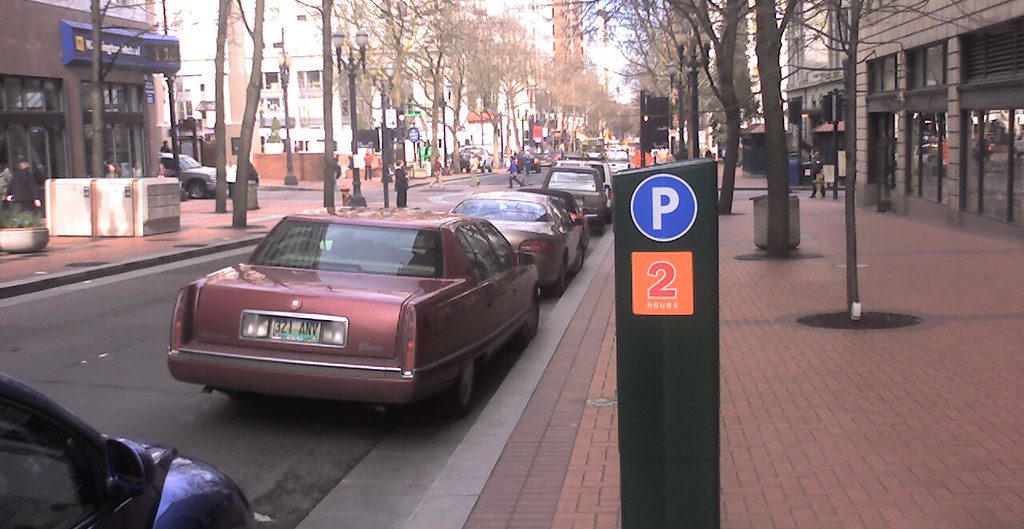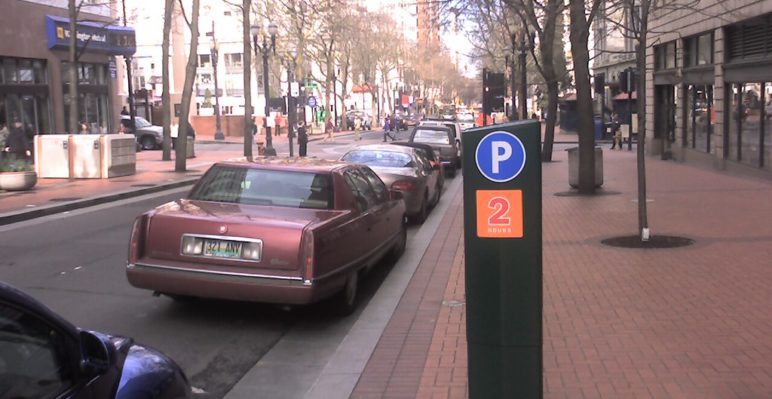Author’s note: Based on our research into the proposal’s effects, Sightline Institute has endorsed ballot measure 26-228, which includes changes to the form of government discussed here.
It’s often said that local elections have the biggest impact on people’s daily lives. That’s why when people ask about how well Portland’s government is working, I just point them to the nearest parking meter.
In 2018 Portland officially adopted a policy to adjust meter rates based on how difficult it is to find a parking spot. If the block is full, prices go up; if the block is empty, prices come down. After San Francisco started adjusting its parking meters this way, drivers saved an average of five minutes looking for parking while paying slightly less at the meter.
But on any given afternoon today, unless you are headed to a stadium on game day, the hourly rate still hasn’t changed. The result has been that growing neighborhoods like Portland’s Northwest district have struggled to free up curb space—40 percent of its blocks are too full by city standards—even after years of improving its parking permit program. That is unlikely to change until meter rates can be more finely tuned.
This is one small story about how Portland’s form of government has left the city with an administrative attention span too short to follow through on its own good ideas.
Great policies get lost in Portland’s current form of government
Sightline has written for years about the smart parking policies that Portland’s city council has adopted that would make it easier for neighborhoods to create parking permit districts and set meter rates at the right price to ensure every block has a few empty spots.
But these parking management tools, while among the best in the country, have been more likely to sit on a shelf than to open up actual parking spots at the curb. The small policy tweaks needed to put these tools into practice have remained unaddressed, high on no one’s list of priorities.
One of the obstacles: Portland’s system of government itself.
It’s just one example of how Portland’s government structure gets in the way of voters’ elected representatives and the policies they want to see. That could change with the proposed charter reform on the ballot this upcoming election, which would expand city council to 12 members and add a city manager to oversee operations.
In most other cities, anyone elected to city council would be able to take an interest in resolving these issues, and a city administrator would be able to keep agencies on track in doing so. But currently in Portland, the mayor delegates oversight of city bureaus among themselves and just four elected commissioners. Even if Donald Shoup himself (an academic researcher who wrote the literal book on parking policy) were elected, there is only a one in five chance he would be assigned oversight of the transportation bureau.
“The existence of the commission system reduced the universe of potential transportation champions by 80 percent.” –Steve Novick, former Portland commissioner

Former commissioner Steve Novick described the fundamental problem with the system in an 2017 op-ed for the Willamette Week. “As soon as you assign bureaus to a commissioner, two things happen: Those bureaus become incredibly important to that commissioner, and everything else the city does becomes relatively unimportant,” he said. “The existence of the commission system reduced the universe of potential transportation champions by 80 percent.”
It’s not as if other commissioners don’t care about issues they don’t have direct oversight over; they simply don’t have the time. Even as Portland’s population has more than tripled over the past century, the number of commissioners has remained the same. Similarly sized cities of Denver and Boston split work among 13 council members compared to Portland’s 5.
Internally referred to as “the commissioner test,” bureaus are highly dependent on their assigned commissioner to bring policy updates to city council. Bureaus can be reassigned at any time to anyone, regardless of if they have expertise or even an interest in the work that agency does.
Multiple times in the past decade, Portland’s Bureau of Transportation (PBOT) was directed to develop a parking strategy under one commissioner, only to have the years of community-led recommendations brushed aside by the next. Over the past decade, the transportation bureau has changed hands about every two years, often to elected officials who had campaigned on different issues.
 The commissioner system politicizes delegating authority to bureaus
The commissioner system politicizes delegating authority to bureaus
The initial recommendation for adjusting parking meters, which was approved by a stakeholder committee and modelled after successful programs in Seattle and San Francisco, would have given PBOT’s director the authority to determine its own meter rates within a set range without having to come back to city council for approval.
But in the discussion that followed, administrative efficiency collided with turf-war politics. City council members assumed that major decisions in the hands of PBOT’s director would effectively be in the hands of one of their peers, using “director” and “commissioner” interchangeably.
And they didn’t want to cede power to one of their peers. Commissioner Dan Saltzman, who oversaw PBOT at the time, overruled the advisory committee recommendation and kept politicians directly in charge of meter rates.
“You may or may not thank me at some future point in time for that,” Saltzman said at the final hearing. “I think it’s important to keep the ultimate authority in the hands of city council.”
Commissioner Chloe Eudaly, who would be assigned the bureau a week later, ran into the consequences of that edit two years later. The COVID pandemic upended on-street parking demand just as rate changes were on schedule to go before council in 2020. Tony Jordan of Portlanders for Parking Reform lobbied PBOT officials and Eudaly’s office to modify the program so it could respond more quickly to changing street conditions. But he ultimately failed to spur any action by the one person who mattered. “Frankly, it wasn’t a top priority in the crisis situation we were in,” Eudaly said in an interview last year.
The current transportation commissioner, Jo Ann Hardesty, is now aiming for an implementation date of 2023, five years after the program was officially adopted. Meanwhile, Seattle has been adjusting meter rates more frequently since the lockdown. On-street parking prices have been adjusted three times this year. For the majority of neighborhoods, it’s cheaper to park than before the pandemic began.
Portland’s neighborhoods still lack solutions for parking problems
Portland didn’t have much experience in managing parking permit districts when the building boom came to SE Division Street nearly a decade ago. So its city council managed the controversy by instituting parking requirements on large multi-family housing instead.
If that same wave of new construction occurred today, would Portland be able to better manage the growth with a residential parking permit program? Technically it is possible, but the rules for creating a new district are so strict that in reality it has been impossible to create one. Out of the nine neighborhoods that expressed interest since 2018, none has been successful in forming a permit district. The Eliot neighborhood, which fell just short of the requirements in 2019, has just started the process all over again.
No politician has tried to remedy the program since Novick, in 2016. Following the unanimous recommendation of a stakeholder committee, he proposed lowering the voting threshold needed from 60 percent approval to a simple majority. He might have eventually succeeded if he had had more time, but Novick lost his reelection bid. It would be two years before the report would make it back to city council in 2018 under the next commissioner, by which point it was only a reference document.
Amid all their other legislative priorities, multiple transportation commissioners have let this program sit idle. Until they put a proposal to reform it back in gear, Portlanders should expect overcrowded curbsides and more rancorous battles over new apartment buildings.
Slow solutions have resulted in large budget problems
The problems caused by the commission system are far larger than being able to find a parking spot.
“City Hall knew, since at least 1987, that we weren’t getting enough money from the state and federal gas tax to maintain streets,” Novick wrote in his 2017 op-ed. For those two decades, instead of being resolved by the whole of city council, the problem was handed down from one transportation commissioner to the next. He put partial blame on the commission form of government itself, which pits commissioners against each other to defend their own agency’s budgets. He was successful in passing a voter referendum for a ten-cent gas tax, but ultimately lost his own reelection bid.
PBOT still faces a structural budget deficit as gas tax revenue continues to decline due to increasingly fuel-efficient vehicles. COVID worsened the situation, with the agency losing $88 million in expected revenue.
Now Commissioner Hardesty, who has overseen PBOT since 2021, is in a depressingly familiar situation. Instead of council coming together to reallocate city general funds, PBOT is again alone in raising its own revenue. And once again, PBOT’s commissioner could change through reelection.
None of the work of collecting data, adjusting meter rates, or creating new permit districts comes for free. But under the current system, agency-created fees only get adjusted intermittently, and less often than needed to keep pace with inflation. The $60 base permit fee that PBOT charges in neighborhoods that do have area parking permits, which was at one time enough to cover the administrative cost, now only covers 60 percent. A 20-cent surcharge added to all parking meter transactions this year, which will help fund transportation programs for low-income Portlanders, was the first widespread increase to on-street parking prices since 2016.
The system of individual commissioners having to adjust bureau fees makes more frequent adjustments dead in the water, according to Jordan. “It’s going to be politicized,” he said.
Charter reform offers a break in the logjam
A year ago, when Portland’s city council adopted yet another committee’s recommendations to implement these two policies among a list of other transportation pricing reforms, Sightline asked if Portland will finally accelerate the pace of parking reform. Our answer now is resolutely: no. We see no visible progress that these two tools—permit districts and performance pricing—are any nearer to the structural changes that are required to effectively implement them.
At the root of these issues is one big problem: individual commissioners are in charge of running individual bureaus in Portland.
At the root of these issues is one big problem: individual commissioners are in charge of running individual bureaus in Portland.

But that all could change if voters adopt ballot measure 26-228, which would change Portland’s city charter. The charter is Portland’s founding document (like a constitution) that outlines how city government works, and every ten years a city-appointed volunteer Charter Commission reviews it for potential amendments. After two years of intensive research and community input, the current commission placed measure 26-228 on the ballot for Portland voters.
Instead of five individual commissioners each running a handful of bureaus, the proposed system would place the mayor and an appointed city administrator in charge of the day-to-day work of government. A 12-member city council elected from 4 geographic districts would focus on legislative roles, making laws and responding to constituent concerns.
This would address many of the issues currently stalling the city’s adopted parking programs. A larger council that supervises bureaus together offers 12 potential policy champions instead of just 1. Frequent turnover in individual commissioners would no longer threaten a sudden change of bureau priorities, as larger shifts in council direction and turnover in professional staff tend to happen more slowly. Budget discussions can focus on a holistic view of city government instead of turf wars between commissioners atop separate bureaus. And the city manager is more insulated from the political dynamics of city council, making them an excellent candidate for administrative decision-making and following up on policies to ensure they get implemented.
These fundamental changes to the incentives in City Hall can help fix the systemic issues holding back good parking policy, to say nothing of many other solutions Portlanders need. Former transportation commissioners seem to agree: both Eudaly and Novick have gone on record about their disdain for the bureau assignment system and the need to move away from it one way or another.
Adopting the charter proposal won’t immediately remedy overcrowded curbs in Portland. But the likelihood that these parking management tools can become dislodged from their perpetually stuck state could go up twelvefold. For anyone frustrated by circling the block again, those would be great odds.
Sightline democracy researcher Jay Lee contributed to this article.












Ethan Seltzer
Sorry but this is a conclusion looking for support. This kind of coverage from Sightline is why I’m rapidly losing faith in what you are doing. This is getting awfully close to the proverlady straw for me.
Ethan Seltzer
That would be “proverbial”…